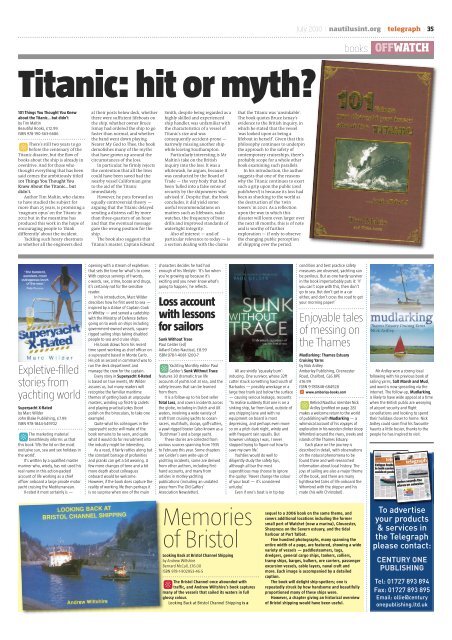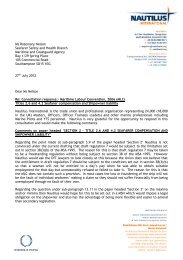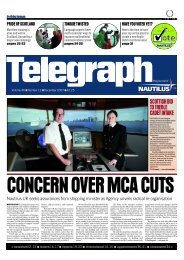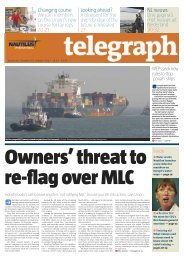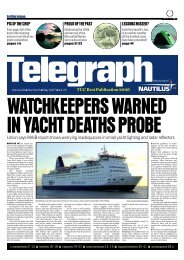You also want an ePaper? Increase the reach of your titles
YUMPU automatically turns print PDFs into web optimized ePapers that Google loves.
July 2010 | nautilusint.org | telegraph | 35<br />
books<br />
OFFWATCH<br />
Titanic: hit or myth?<br />
101 Things You Thought You Knew<br />
about the Titanic… but didn’t<br />
by Tim Maltin<br />
Beautiful Books, £12.99<br />
ISBN 978-190-563-6686<br />
There’s still two years to go<br />
Kbefore the centenary of the<br />
Titanic disaster, but the flow of<br />
books about the ship is already in<br />
overdrive. And for those who<br />
thought everything that has been<br />
said comes the ambitiously titled<br />
101 Things You Thought You<br />
Knew About the Titanic… but<br />
didn’t.<br />
Author Tim Maltin, who claims<br />
to have studied the subject for<br />
more than 25 years, is promising a<br />
‘magnum opus’ on the Titanic in<br />
2012 but in the meantime has<br />
produced this work in the hope of<br />
encouraging people to ‘think<br />
differently’ about the incident.<br />
Tackling such hoary chestnuts<br />
as whether all the engineers died<br />
at their posts below deck, whether<br />
there were sufficient lifeboats on<br />
the ship, whether owner Bruce<br />
Ismay had ordered the ship to go<br />
faster than normal, and whether<br />
the band went down playing<br />
Nearer My God to Thee, the book<br />
demolishes many of the myths<br />
that have grown up around the<br />
circumstances of the loss.<br />
In particular, he firmly rejects<br />
the contention that all the lives<br />
could have been saved had the<br />
nearby vessel Californian gone<br />
to the aid of the Titanic<br />
immediately.<br />
However, he puts forward an<br />
equally controversial theory —<br />
arguing that the Titanic delayed<br />
sending a distress call by more<br />
than three-quarters of an hour<br />
and that the eventual message<br />
gave the wrong position for the<br />
ship.<br />
The book also suggests that<br />
Titanic’s master, Captain Edward<br />
Smith, despite being regarded as a<br />
highly skilled and experienced<br />
ship handler, was unfamiliar with<br />
the characteristics of a vessel of<br />
Titanic’s size and was<br />
consequently accident-prone —<br />
narrowly missing another ship<br />
while leaving Southampton.<br />
Particularly interesting is Mr<br />
Maltin’s take on the British<br />
inquiry into the loss. It was a<br />
whitewash, he argues, because it<br />
was conducted by the Board of<br />
Trade — the very body that had<br />
been ‘lulled into a false sense of<br />
security by the shipowners who<br />
advised it’. Despite that, the book<br />
concludes, it did yield some<br />
useful recommendations on<br />
matters such as lifeboats, radio<br />
watches, the frequency of boat<br />
drills and improved standards of<br />
watertight integrity.<br />
Also of interest — and of<br />
particular relevance to today — is<br />
a section dealing with the claims<br />
that the Titanic was ‘unsinkable’.<br />
The book quotes Bruce Ismay’s<br />
evidence to the British inquiry, in<br />
which he stated that the vessel<br />
‘was looked upon as being a<br />
lifeboat in herself’. Given that this<br />
philosophy continues to underpin<br />
the approach to the safety of<br />
contemporary cruiseships, there’s<br />
probably scope for a whole other<br />
book examining such parallels.<br />
In his introduction, the author<br />
suggests that one of the reasons<br />
why the Titanic continues to exert<br />
such a grip upon the public (and<br />
publishers!) is because its loss had<br />
been as shocking to the world as<br />
the destruction of the ‘twin<br />
towers’ in 2001. As a reflection<br />
upon the way in which this<br />
disaster will loom even larger over<br />
the next 18 months, this is of note<br />
and is worthy of further<br />
exploration — if only to observe<br />
the changing public perception<br />
of shipping over the period.<br />
Expletive-filled<br />
stories from<br />
yachting world<br />
Superyacht X-Rated<br />
by Marc Wilder<br />
John Blake Publishing, £7.99<br />
ISBN 978-1844-549702<br />
The marketing material<br />
Kbreathlessly informs us that<br />
this book ‘lifts the lid on the most<br />
exclusive sun, sea and sex holidays in<br />
the world’.<br />
It’s written by a qualified master<br />
mariner who, wisely, has not used his<br />
real name in this action-packed<br />
account of life working as a chief<br />
officer onboard a large private motor<br />
yacht cruising the Mediterranean.<br />
X-rated it most certainly is —<br />
opening with a stream of expletives<br />
that sets the tone for what’s to come.<br />
With copious servings of f-words,<br />
c-words, sex, crime, booze and drugs,<br />
it’s certainly not for the sensitive<br />
reader.<br />
In his introduction, Marc Wilder<br />
describes how he first went to sea —<br />
inspired by a statue of Captain Cook<br />
in Whitby — and served a cadetship<br />
with the Ministry of Defence before<br />
going on to work on ships including<br />
government-owned vessels, squarerigged<br />
sailing ships taking disabled<br />
people to sea and cruise ships.<br />
His book draws from his recent<br />
time spent working as chief officer on<br />
a superyacht based in Monte Carlo.<br />
His job as second in command was to<br />
run the deck department and<br />
manage the crew for the captain.<br />
Every story in Superyacht X-Rated<br />
is based on true events, Mr Wilder<br />
assures us, but many readers will<br />
recognise the familiar maritime<br />
themes of getting back at unpopular<br />
masters, winding up first-trip cadets<br />
and playing practical jokes (boot<br />
polish on the binoculars, to take one<br />
example).<br />
Quite what his colleagues in the<br />
superyacht sector will make of the<br />
book remains to be seen, and quite<br />
what it would do for recruitment into<br />
the industry might be interesting.<br />
As a read, it fairly rattles along but<br />
the constant barrage of profanities<br />
and pranks can get a bit wearing. A<br />
few more changes of tone and a bit<br />
more depth about colleagues<br />
onboard would be welcome.<br />
However, if the book does capture the<br />
reality of working life then perhaps it<br />
is no surprise when one of the main<br />
characters decides he had had<br />
enough of his lifestyle: ‘It’s fun when<br />
you’re growing up because it’s<br />
exciting and you never know what’s<br />
going to happen,’ he reflects.<br />
Loss account<br />
with lessons<br />
for sailors<br />
Sunk Without Trace<br />
Paul Gelder (ed)<br />
Adlard Coles Nautical, £8.99<br />
ISBN 978-1-4081-1200-7<br />
Yachting Monthly editor Paul<br />
KGelder’s Sunk Without Trace<br />
features 30 dramatic true life<br />
accounts of yachts lost at sea, and the<br />
safety lessons that can be learned<br />
from them.<br />
It is a follow-up to his best seller<br />
Total Loss, and covers incidents across<br />
the globe, including in Dutch and UK<br />
waters, involving a wide variety of<br />
craft from cruising yachts to oceanracers,<br />
multihulls, sloops, gaff-cutters,<br />
a yawl-rigged boeier (also known as a<br />
‘Dutchman’) and a barge yacht.<br />
These stories are collected from<br />
various sources spanning from 1935<br />
to February this year. Some chapters<br />
are Gelder’s own write-ups of<br />
yachting incidents, some are derived<br />
from other authors, including firsthand<br />
accounts, and many from<br />
articles in motley yachting<br />
publications (including an undated<br />
piece from The Old Gaffers’<br />
Association Newsletter).<br />
All are vividly ‘squeaky bum’-<br />
inducing. One survivor, whose 32ft<br />
cutter struck something hard south of<br />
Barbados — possibly wreckage or a<br />
large tree trunk just below the surface<br />
— causing serious leakage, recounts:<br />
‘To realise suddenly that one is on a<br />
sinking ship, far from land, outside of<br />
any shipping lane and with no<br />
equipment on board is most<br />
depressing, and perhaps even more<br />
so on a pitch dark night, windy and<br />
with frequent rain squalls. But<br />
however unhappy I was, I never<br />
stopped trying to figure out how to<br />
save my own life.’<br />
Yachties would do well to<br />
diligently study the safety tips,<br />
although all bar the most<br />
superstitious may choose to ignore<br />
the quirky: ‘Never change the colour<br />
of your boat — it’s considered<br />
unlucky.’<br />
Even if one’s boat is in tip-top<br />
condition and best practice safety<br />
measures are observed, yachting can<br />
be perilous. But as one hardy survivor<br />
in the book imperturbably puts it: ‘If<br />
you can’t cope with this, then don’t<br />
go to sea. But don’t get in a car<br />
either, and don’t cross the road to get<br />
your morning paper!’<br />
Enjoyable tales<br />
of messing on<br />
the Thames<br />
Mudlarking: Thames Estuary<br />
Cruising Yarns<br />
by Nick Ardley<br />
Amberley Publishing, Cirencester<br />
Road, Chalford, GL6 8PE<br />
£16.99<br />
ISBN 9-781848-684928<br />
f www.amberley-books.com<br />
Retired <strong>Nautilus</strong> member Nick<br />
KArdley (profiled on page 28)<br />
makes a welcome return to the world<br />
of publishing with Mudlarking — a<br />
whimsical account of his voyages of<br />
exploration in his wooden clinker sloop<br />
Whimbrel around the rivers, creeks and<br />
islands of the Thames Estuary.<br />
Each place on the journey is<br />
described in detail, with observations<br />
on the natural phenomena to be<br />
found there and well-researched<br />
information about local history. The<br />
joys of sailing are also a major theme<br />
of the book, and there are many<br />
lighthearted tales of life onboard the<br />
Whimbrel with the skipper and his<br />
mate (his wife Christobel).<br />
Mr Ardley won a strong local<br />
following with his previous book of<br />
sailing yarns, Salt Marsh and Mud,<br />
and word is now spreading via the<br />
internet. The follow-up, Mudlarking,<br />
is likely to have wide appeal at a time<br />
when the British public are wearying<br />
of airport security and flight<br />
cancellations and looking to spend<br />
their holidays closer to home. Nick<br />
Ardley could soon find his favourite<br />
haunts a little busier, thanks to the<br />
people he has inspired to visit.<br />
Memories<br />
of Bristol<br />
Looking Back at Bristol Channel Shipping<br />
by Andrew Wiltshire<br />
Bernard McCall, £16.00<br />
ISBN 978-1-902953-46-5<br />
The Bristol Channel once abounded with<br />
Ktraffic, and Andrew Wiltshire’s book captures<br />
many of the vessels that sailed its waters in full<br />
glossy colour.<br />
Looking Back at Bristol Channel Shipping is a<br />
sequel to a 2006 book on the same theme, and<br />
covers additional locations including the former<br />
small port of Watchet (now a marina), Gloucester,<br />
Sharpness on the Severn estuary, and the tidal<br />
harbour at Port Talbot.<br />
Five hundred photographs, many spanning the<br />
entire width of a page, are featured, showing a wide<br />
variety of vessels — paddlesteamers, tugs,<br />
dredgers, general cargo ships, tankers, colliers,<br />
tramp ships, barges, bulkers, ore carriers, passenger<br />
excursion vessels, cable layers, naval craft and<br />
more. Each image is accompanied by a detailed<br />
caption.<br />
The book will delight ship-spotters; one is<br />
repeatedly struck by how handsome and beautifully<br />
proportioned many of these ships were.<br />
However, a chapter giving an historical overview<br />
of Bristol shipping would have been useful.<br />
To advertise<br />
your products<br />
& services in<br />
the Telegraph<br />
please contact:<br />
CENTURY ONE<br />
PUBLISHING<br />
Tel: 01727 893 894<br />
Fax: 01727 893 895<br />
Email: ollie@century<br />
onepublishing.ltd.uk


